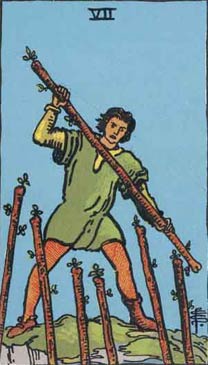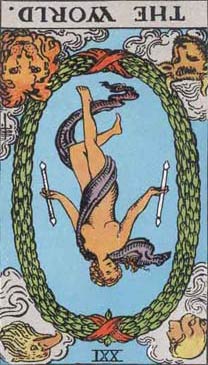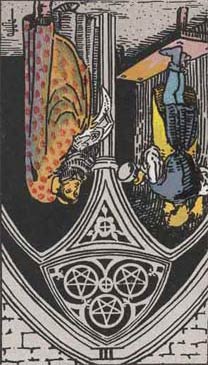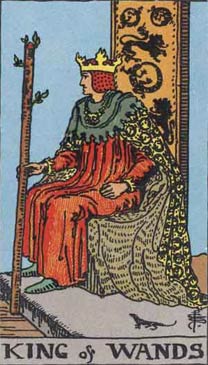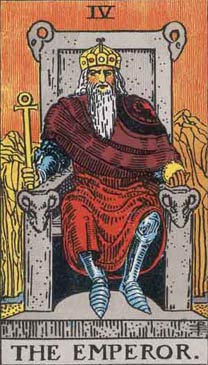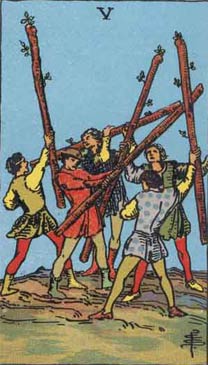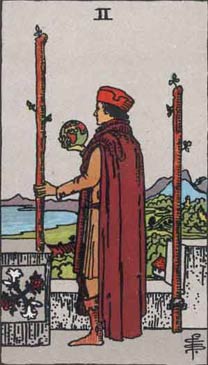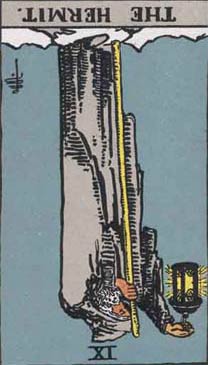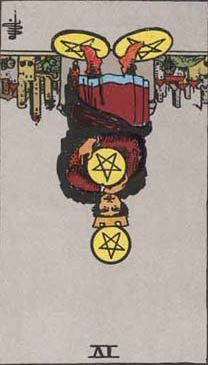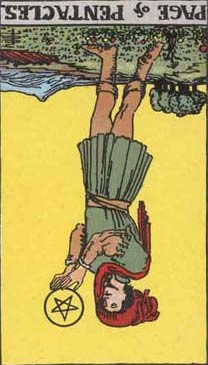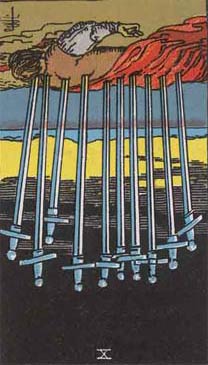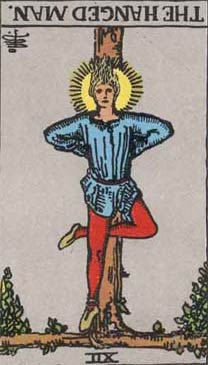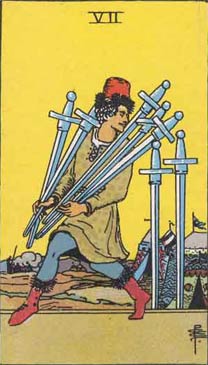Golden Dawn Spread
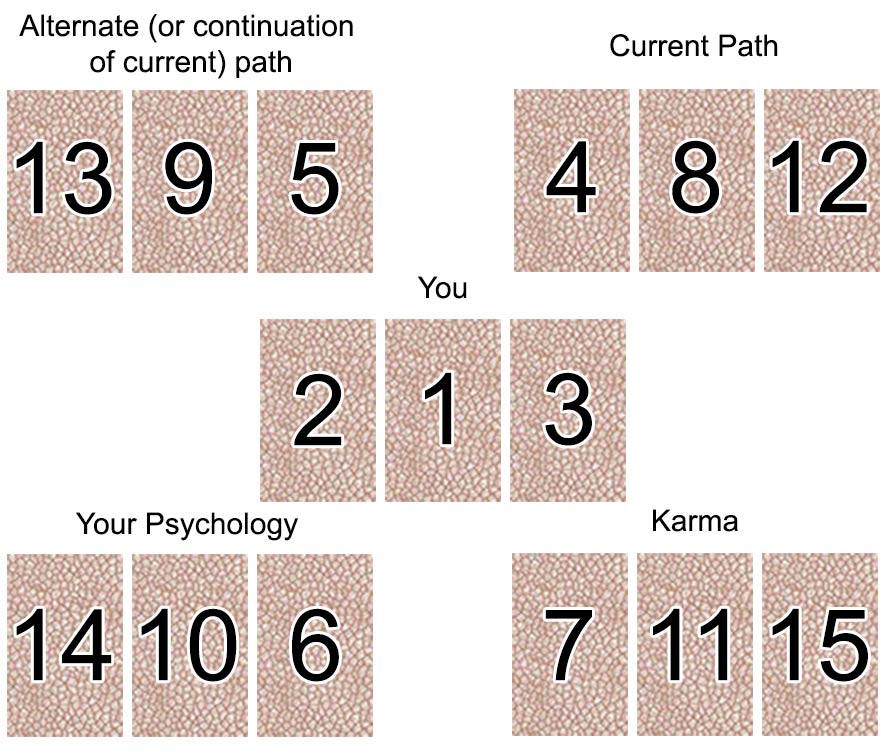
Spread Positions
Your Golden Dawn Reading
| The Alternate Path (or Extension of Current Path) |
Your Current Path |
|||||
5 of Wands |
2 of Wands |
The Hermit |
King of Wands |
The Emperor |
3 of Cups |
|
| You | ||||||
The World |
7 of Wands |
3 of Pentacles |
||||
| The Psychological Basis | Karma | |||||
4 of Pentacles |
Page of Pentacles |
10 of Swords |
The High Priestess |
The Hanged Man |
7 of Swords |
|
This spread may not be the most compatible with the Rider Waite deck, but we thought it was interesting and decided to include it anyway. This spread is set up to not use reversals, instead flipping all cards upright and interpreting each card according to its elemental dignity.
In this spread particular attention should be payed to a card's exact position in relation to its neighbors. Whether the neighbor cards bear the same energy (suit) determines whether a card is considered well- or ill-dignified. Opposite suits ill-dignify each other, while other suits are considered friendly. Cards of the same suit strengthen each other.
Also it's always good to note the cards' tendencies - such as whether there is a lot of one particular suit or number pattern. Patterns reveal special messages. Lots of Major Arcana means higher forces at work, lots of cups means strong emotions, etc.
You
Cards represent the querent and the nature of the topic at hand. The first card (in the center of the spread) represents the very core of the matter, and the other 2 cards around it are added to it in order to further comprehend the nature of the topic.
A young man on a craggy eminence brandishing a staff; six other staves are raised towards him from below.
Divinatory Meaning:
It is a card of valour, for, on the surface, six are attacking one, who has, however, the vantage position. On the intellectual plane, it signifies discussion, wordy strife; in business - negotiations, war of trade, barter, competition. It is further a card of success, for the combatant is on the top and his enemies may be unable to reach him.
As this final message of the Major Trumps is unchanged - and indeed unchangeable - in respect of its design, it has been partly described already regarding its deeper sense. It represents also the perfection and end of the Cosmos, the secret which is within it, the rapture of the universe when it understands itself in God. It is further the state of the soul in the consciousness of Divine Vision, reflected from the self-knowing spirit. But these meanings are without prejudice to that which I have said concerning it on the material side.
It has more than one message on the macrocosmic side and is, for example, the state of the restored world when the law of manifestation shall have been carried to the highest degree of natural perfection. But it is perhaps more especially a story of the past, referring to that day when all was declared to be good, when the morning stars sang together and all the Sons of God shouted for joy. One of the worst explanations concerning it is that the figure symbolizes the Magus when he has reached the highest degree of initiation; another account says that it represents the absolute, which is ridiculous. The figure has been said to stand for Truth, which is, however, more properly allocated to the seventeenth card. Lastly, it has been called the Crown of the Magi.
Reversed Meaning:
Inertia, fixity, stagnation, permanence.
A sculptor at his work in a monastery. Compare the design which illustrates the Eight of Pentacles. The apprentice or amateur therein has received his reward and is now at work in earnest.
Reversed Meaning:
Mediocrity, in work and otherwise, puerility, pettiness, weakness.
Your Current Path
Cards represent your current path as it would unfold naturally. These cards are read in chronological order from left to right.
The physical and emotional nature to which this card is attributed is dark, ardent, lithe, animated, impassioned, noble. The King uplifts a flowering wand, and wears, like his three correspondences in the remaining suits, what is called a cap of maintenance beneath his crown. He connects with the symbol of the lion, which is emblazoned on the back of his throne.
Divinatory Meaning:
Dark man, friendly, countryman, generally married, honest and conscientious. The card always signifies honesty, and may mean news concerning an unexpected heritage to fall in before very long.
He has a form of the Crux ansata for his sceptre and a globe in his left hand. He is a crowned monarch - commanding, stately, seated on a throne, the arms of which axe fronted by ram heads. He is executive and realization, the power of this world, here clothed with the highest of its natural attributes. He is occasionally represented as seated on a cubic stone, which, however, confuses some of the issues. He is the virile power, to which the Empress responds, and in this sense is he who seeks to remove the Veil of Isis; yet she remains virgo intacta.
It should be understood that this card and that of the Empress do not precisely represent the condition of married life, though this state is implied. On the surface, as I have indicated, they stand for mundane royalty, uplifted on the seats of the mighty; but above this there is the suggestion of another presence. They signify also - and the male figure especially - the higher kingship, occupying the intellectual throne. Hereof is the lordship of thought rather than of the animal world. Both personalities, after their own manner, are full of strange experience, but theirs is not consciously the wisdom which draws from a higher world. The Emperor has been described as (a) will in its embodied form, but this is only one of its applications, and (b) as an expression of virtualities contained in the Absolute Being - but this is fantasy.
Divinatory Meaning:
Stability, power, protection, realization; a great person; aid, reason, conviction; also authority and will.
Maidens in a garden-ground with cups uplifted, as if pledging one another.
Reversed Meaning:
Expedition, dispatch, achievement, end. It signifies also the side of excess in physical enjoyment, and the pleasures of the senses.
The Alternate Path
Cards represent the alternate path that you could choose to take in lieu of the Current Path. However, if the cards that come up seem to indicate that they go along with the Current Path, these 3 cards should be interpretted not as an Alternate Path, but as a chronological extension of the Current Path (also read from left to right).
A posse of youths, who are brandishing staves, as if in sport or strife. It is mimic warfare.
Divinatory Meaning:
Imitation, as, for example, sham fight, but also the strenuous competition and struggle of the search after riches and fortune. In this sense it connects with the battle of life. Hence some attributions say that it is a card of gold, gain, opulence.
A tall man looks from a battlemented roof over sea and shore; he holds a globe in his right hand, while a staff in his left rests on the battlement; another is fixed in a ring. The Rose and Cross and Lily should be noticed on the left side.
Divinatory Meaning:
Between the alternative readings there is no marriage possible; on the one hand, riches, fortune, magnificence; on the other, physical suffering, disease, chagrin, sadness, mortification. The design gives one suggestion; here is a lord overlooking his dominion and alternately contemplating a globe; it looks like the malady, the mortification, the sadness of Alexander amidst the grandeur of this world's wealth.
A young lady may expect trivial disappointments.
The variation from the conventional models in this card is only that the lamp is not enveloped partially in the mantle of its bearer, who blends the idea of the Ancient of Days with the Light of the World It is a star which shines in the lantern. I have said that this is a card of attainment, and to extend this conception the figure is seen holding up his beacon on an eminence. Therefore the Hermit is not, as Court de Gebelin explained, a wise man in search of truth and justice; nor is he, as a later explanation proposes, an especial example of experience. His beacon intimates that - where I am, you also may be.
It is further a card which is understood quite incorrectly when it is connected with the idea of occult isolation, as the protection of personal magnetism against admixture. This is one of the frivolous renderings which we owe to Eliphas Levi. It has been adopted by the French Order of Martinism and some of us have heard a great deal of the Silent and Unknown Philosophy enveloped by his mantle from the knowledge of the profane. In true Martinism, the significance of the term Philosophe inconnu was of another order. It did not refer to the intended concealment of the Instituted Mysteries, much less of their substitutes, but - like the card itself - to the truth that the Divine Mysteries secure their own protection from those who are unprepared.
Reversed Meaning:
Concealment, disguise, policy, fear, unreasoned caution.
The Psychological Basis
Cards shed light upon the psychological undertones of the current problem.
A crowned figure, having a pentacle over his crown, clasps another with hands and arms; two pentacles are under his feet. He holds to that which he has.
Reversed Meaning:
Suspense, delay, opposition.
A youthful figure, looking intently at the pentacle which hovers over his raised hands. He moves slowly, insensible of that which is about him.
Reversed Meaning:
Prodigality, dissipation, liberality, luxury; unfavourable news.
A prostrate figure, pierced by all the swords belonging to the card.
Reversed Meaning:
Advantage, profit, success, favour, but none of these are permanent; also power and authority.
Karma
- These cards represent the influences of karma and destiny that are beyond your control. They suggest adapting to this fate.
She has the lunar crescent at her feet, a horned diadem on her head, with a globe in the middle place, and a large solar cross on her breast. The scroll in her hands is inscribed with the word Tora, signifying the Greater Law, the Secret Law and the second sense of the Word. It is partly covered by her mantle, to shew that some things are implied and some spoken. She is seated between the white and black pillars - J. and B. - of the mystic Temple, and the veil of the Temple is behind her: it is embroidered with palms and pomegranates. The vestments are flowing and gauzy, and the mantle suggests light - a shimmering radiance. She has been called occult Science on the threshold of the Sanctuary of Isis, but she is really the Secret Church, the House which is of God and man. She represents also the Second Marriage of the Prince who is no longer of this world; she is the spiritual Bride and Mother, the daughter of the stars and the Higher Garden of Eden. She is, in fine, the Queen of the borrowed light, but this is the light of all. She is the Moon nourished by the milk of the Supernal Mother.
In a manner, she is also the Supernal Mother herself - that is to say, she is the bright reflection. It is in this sense of reflection that her truest and highest name in bolism is Shekinah - the co-habiting glory. According to Kabalism, there is a Shekinah both above and below. In the superior world it is called Binah, the Supernal Understanding which reflects to the emanations that are beneath. In the lower world it is MaIkuth - that world being, for this purpose, understood as a blessed Kingdom that with which it is made blessed being the Indwelling Glory. Mystically speaking, the Shekinah is the Spiritual Bride of the just man, and when he reads the Law she gives the Divine meaning. There are some respects in which this card is the highest and holiest of the Greater Arcana.
Divinatory Meaning:
Secrets, mystery, the future as yet unrevealed; the woman who interests the Querent, if male; the Querent herself, if female; silence, tenacity; mystery, wisdom, science.
The gallows from which he is suspended forms a Tau cross, while the figure - from the position of the legs - forms a fylfot cross. There is a nimbus about the head of the seeming martyr. It should be noted (1) that the tree of sacrifice is living wood, with leaves thereon; (2) that the face expresses deep entrancement, not suffering; (3) that the figure, as a whole, suggests life in suspension, but life and not death. It is a card of profound significance, but all the significance is veiled. One of his editors suggests that Eliphas Levi did not know the meaning, which is unquestionable nor did the editor himself. It has been called falsely a card of martyrdom, a card of prudence, a card of the Great Work, a card of duty; but we may exhaust all published interpretations and find only vanity. It expresses the relation, in one of its aspects, between the Divine and the Universe.
He who can understand that the story of his higher nature is imbedded in this symbolism will receive intimations concerning a great awakening that is possible, and will know that after the sacred Mystery of Death there is a glorious Mystery of Resurrection.
Reversed Meaning:
Selfishness, the crowd, body politic.
A man in the act of carrying away five swords rapidly; the two others of the card remain stuck in the ground. A camp is close at hand.
Divinatory Meaning:
Design, attempt, wish, hope, confidence; also quarrelling, a plan that may fail, annoyance. The design is uncertain in its import, because the significations are widely at variance with each other.


